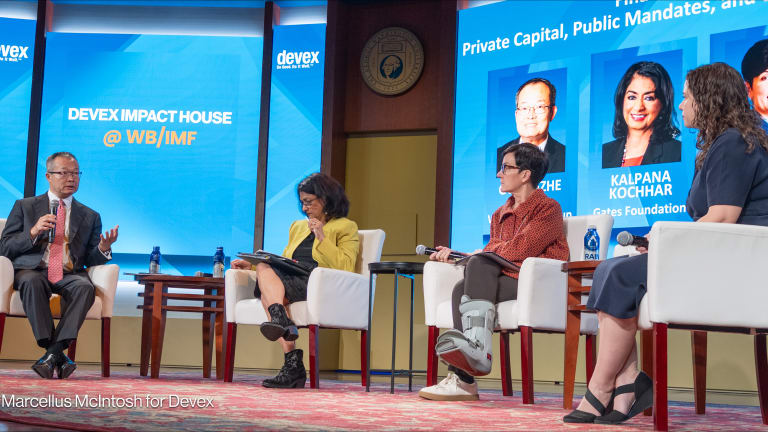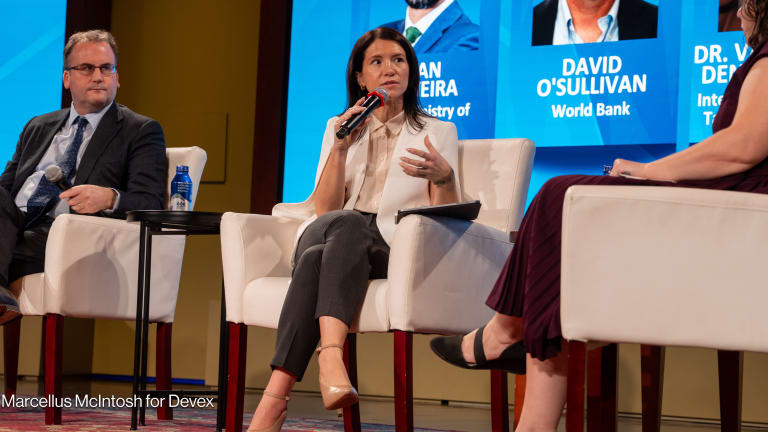
We have raised the bar on our development aspirations. The world’s new sustainable development goals are much bolder and more ambitious than their predecessor, the Millennium Development Goals. That they will cost trillions to achieve is obvious. It’s probably why the World Bank Group named its recent report “From Billions to Trillions.”
Many analysts doubt however whether we’ll raise the bar on development finance. Civil society organizations, for instance, decried the outcome of the U.N.’s recent conference on financing for development as wholly inadequate. The conference outcome document — the Addis Ababa Action Agenda — outlined the international community’s plan for financing the world’s new sustainable development agenda.
“We are disappointed that the F4D process has not yielded new resources to fund the investments needed to end poverty or taken meaningful steps to address problems in the international financial system,” said Danny Sriskandarajah, secretary-general of Civicus.
Should we be so pessimistic however? Yes, the United Nations and member states are probably prone to overstate what countries have really committed to. It’s also true that very few donor countries allocate 0.7 percent of the gross national income to official development assistance, the United Nations’ recommended level.
The newest commitment is to reach this level by 2030, a promise few believe. Much to the disappointment of the least developed countries and the small island developing states, there were no concrete promises of extra resources. And NGOs, as well as many developing nations, had hoped for more progress on international tax cooperation and a commitment to establish a sovereign bankruptcy framework.
But for all the politics — and frustrations — of these international processes, the reality is that there are more resources and capabilities than ever before to tackle the world’s sustainable development challenges. More development finance is available than ever before, from both public and private sources.
Domestic resources in the developing world are at more than $7 trillion annually and continue to rise. Combined, foreign direct investment, ODA, South-South cooperation, philanthropic and other international flows exceed $2 trillion annually. Emerging economies may be reluctant to sign up to specific targets to expand their development cooperation and investment programs but are likely to increase such contributions anyway because they see it as in their own national interest.
There is also much innovation in public and private financing instruments which can enable countries to access the types of financing most suited to their needs. These include schemes that pool resources to leverage additional finance or to achieve more results for the same money, financing instruments that reduce risk for sovereign states, investors or consumers (such as countercyclical loans, local currency finance and weather insurance) and “payment for results” schemes where payments are made when specific results are achieved. There has also been an increase in socially and environmentally responsible investing, and there is considerable room for further expansion. Institutional investors, such as pension funds and sovereign wealth funds are another potential source of long-term finance for developing countries, and political risk and policy uncertainty — often cited by investors as a reason not to invest in such economies — has fallen, on average. While NGOs may not have secured the global tax body they wanted, the issues of tax avoidance and evasion — and the need for international cooperation to effectively address these challenges — are firmly on the political agenda. NGO research and advocacy on this issue has also become highly sophisticated and effective.
Despite an increasingly rich and diverse development finance landscape however, challenges remain. For instance, international financial flows tend to be heavily concentrated in middle-income countries and resource-rich low-income countries. ODA is uneven and often not targeted toward those countries most in need. Socially and environmentally responsible investing remains far from the mainstream.
Countries’ capacities to develop high-quality bankable project proposals especially in the area of infrastructure are another constraint. Looking forward, this will be a major determinant of convergence or divergence. Much financing is also in the form of debt instruments, and we must be careful not to sow the seeds of future debt crises. Climate change meanwhile is increasing the cost of development.
If anything, the financing for development conference revealed that there is no shortage of good ideas. It’s not automatically “over and out” for the SDGs. What is needed is political will to mobilize more resources and to steer finance in different directions — both thematically and geographically. There are no silver bullets and more money alone is not sufficient; the quality and efficiency of government spending matters.
Governments’ commitments to stay engaged on this agenda — and to be held accountable for their actions — will be critical. The U.N. conference on financing for development proposed a strengthened monitoring process at the international level which is positive. We all need to play a role in making sure the SDGs don’t remain a simple “wish-list” for the future.
Join the Devex community and access more in-depth analysis, breaking news and business advice — and a host of other services — on international development, humanitarian aid and global health.








